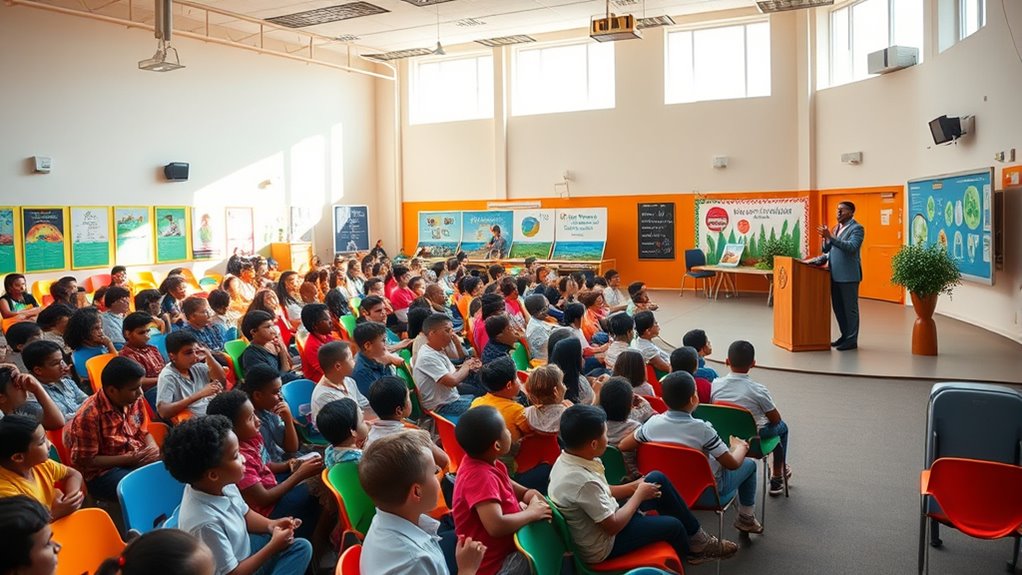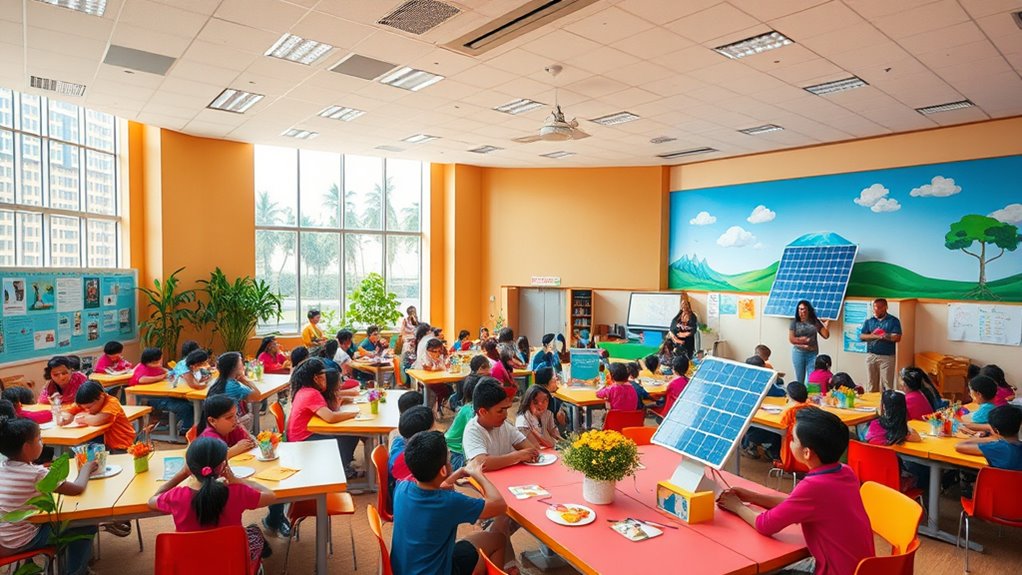During Climate Week, students and schools can participate in engaging activities like workshops, presentations, and campaigns that highlight renewable energy and sustainability. You can incorporate these topics into lessons, organize clean-ups, or plant trees to boost environmental awareness. Getting involved in campaigns or talking with experts can inspire action and leadership. These initiatives help you understand how grassroots efforts influence policy and foster a passion for renewable energy—explore further to discover how to make an impact.
Key Takeaways
- Schools can host workshops and campaigns to raise awareness about renewable energy and climate action during Climate Week.
- Incorporating renewable energy topics into lessons enhances student understanding of sustainable solutions.
- Students can participate in community clean-ups, tree-planting drives, and activism initiatives to foster responsibility.
- Engagement with climate experts through talks and projects inspires careers and deeper knowledge in sustainability.
- Climate Week activities empower students to advocate for policy changes and take grassroots action on climate issues.

Have you ever wondered how students and schools can make a real difference in fighting climate change? One powerful way is through education that promotes renewable energy and environmental activism. During Climate Week, students have a unique opportunity to learn about sustainable solutions and to become active participants in creating a greener future. Schools can host workshops, presentations, and campaigns that highlight the importance of progressing toward renewable energy sources like solar, wind, and hydropower. These initiatives not only increase awareness but inspire students to advocate for policies that prioritize clean energy investments. By integrating renewable energy topics into classroom lessons, students develop a deeper understanding of how shifting away from fossil fuels can drastically reduce greenhouse gas emissions, directly contributing to climate mitigation efforts. Awareness of regional resources and local initiatives can further enhance their engagement and impact. Engaging with renewable energy technologies helps students grasp the practical applications of sustainable power and fosters innovation. Understanding the benefits of renewable energy can motivate students to support clean energy projects in their communities. Environmental activism is at the heart of what students can do during Climate Week. When you get involved, you’re not just learning about climate issues—you’re taking action. Schools can organize community clean-ups, tree-planting drives, or awareness campaigns that encourage peers and local residents to participate. These activities help foster a sense of responsibility and empowerment, showing that everyone has a role in combating climate change. Students can also push for their schools to adopt more sustainable practices, such as installing solar panels or reducing waste. When students actively participate in these efforts, they become catalysts for change, demonstrating that grassroots activism can influence broader policy decisions. Educational programs during Climate Week also provide a platform for students to engage with experts and activists working on renewable energy projects and climate justice initiatives. Attending talks or workshops helps them see the real-world impact of environmental activism and understand the importance of persistent advocacy. This exposure can ignite passions that last a lifetime and motivate students to pursue careers in science, engineering, or policy-making focused on sustainable solutions. Additionally, these experiences show students how their voices matter, empowering them to challenge existing systems and push for a shift toward renewable energy policies at local, national, and even global levels.
Frequently Asked Questions
How Can Schools Measure the Impact of Their Climate Week Activities?
You can measure the impact of your Climate Week activities by collecting student feedback through surveys or discussions to gauge awareness and enthusiasm. Track activity participation rates to see how many students engage in events. Additionally, observe changes in students’ behavior or attitudes toward climate actions over time. Combining feedback, participation data, and behavioral observations helps you evaluate how effectively your activities are fostering environmental awareness and engagement.
What Are Some Cost-Effective Ways to Promote Climate Education?
Your efforts to promote climate education can transform the classroom into a hub of student engagement. Cost-effective strategies include integrating climate topics into existing curricula, encouraging student-led projects, and leveraging free digital resources. These approaches make a profound impact without straining budgets. By actively involving students and weaving climate themes into daily lessons, you create a powerful, lasting influence that sparks curiosity and fosters environmental stewardship.
How Can Students Lead Climate Initiatives Beyond Climate Week?
You can lead climate initiatives beyond Climate Week by embracing student activism and demonstrating green leadership. Organize clubs or campaigns that focus on sustainability efforts, like recycling or tree planting, and encourage your peers to join. Use social media to spread awareness and influence change. Collaborate with teachers and local organizations to expand your impact. Your proactive approach inspires others and sustains momentum for ongoing environmental action.
What Role Do Parents and Communities Play in School Climate Efforts?
Imagine the moment when your community’s passion ignites real change. As a parent, your engagement fuels school climate efforts, creating a ripple effect that inspires students. Your involvement fosters community involvement, strengthening partnerships and encouraging sustainable habits. When you actively support school initiatives, you help shape an environment where everyone cares about climate action. Together, your commitment becomes a powerful catalyst for lasting change, inspiring future generations to prioritize our planet.
How Can Schools Ensure Inclusivity in Climate Education Programs?
You can guarantee inclusivity in climate education programs by actively incorporating cultural diversity and making accessibility enhancements. Use diverse teaching materials that reflect different cultures and perspectives, and adapt activities to accommodate all students, including those with disabilities. Encourage open discussions that respect varied viewpoints, fostering a welcoming environment. By prioritizing these efforts, you create a more inclusive space where every student feels valued and engaged in climate learning.
Conclusion
As you step into this Climate Week, remember you’re planting seeds of change that will blossom into a greener future. Every action you take is a brushstroke on the canvas of our planet, shaping a vibrant, sustainable world. Your voice is a powerful wind that can stir ripples of awareness and action. Embrace this opportunity to be a shining star in the constellation of young changemakers, illuminating the path toward a healthier Earth.









